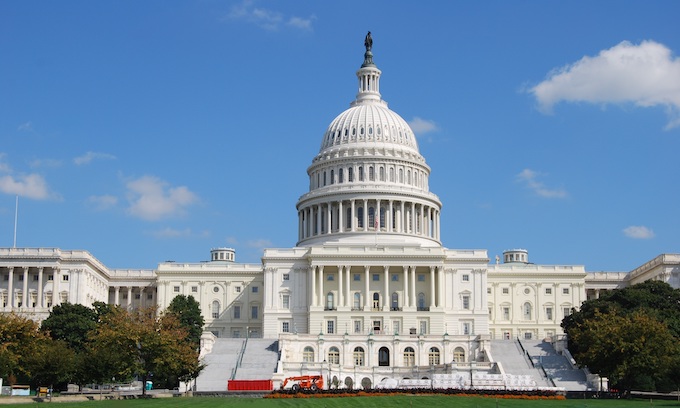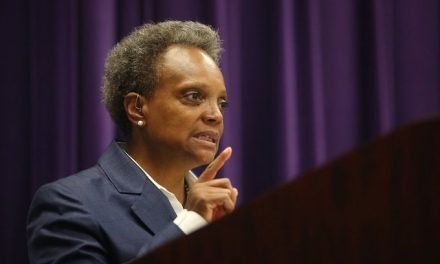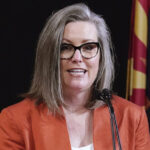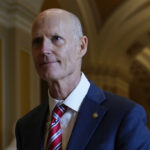A more subdued House Republican conference returned to Washington for its third speaker candidate search on Oct. 23.
After an emotional three week, which began with the ouster of the former speaker and included the failed candidacies of two Republican speaker designees, members appeared more relaxed and ready to cooperate on finding a candidate who can earn the 217 Republican votes needed for election.
“It seems like there’s less emotion in the room,” Rep. Nick Lalota (R-N.Y.) told reporters during the evening event. “There’s less stubbornness. There’s more reasonability.”
Over the weekend, members heard from constituents who, regardless of political affiliation, urged members to come together and return to governing. The House has been effectively closed since Oct. 3 when former Speaker Kevin McCarthy (R-Calif.) became the first speaker to be removed by a vote of the House.
Reps. Steve Scalise (R-La.) and Jim Jordan (R-Ohio) each took a shot at the speakership over the last two weeks but were unable to reach 217 votes.
Mr. Scalise realized that he did not have adequate support from the Republican conference and withdrew his name on Oct. 12. Mr. Jordan exited the race on Oct. 20 after coming up short in three floor votes followed by a vote of no confidence in the Republican conference.
Over the weekend, nine Republicans announced their bid for the speakership: Majority Whip Tom Emmer (R-Min.) who is the most senior, Reps. Mike Johnson (R-La.), Byron Donalds (R-Fla.), Kevin Hern (R-Okla), Jack Bergman (R-Mich.), Austin Scott (R-Ga.), Pete Sessions (R-Texas), Gary Palmer (R-Ala.), and Dan Meuser (R-Pa.).
Mr. Meusner subsequently withdrew from the race.
At the Oct. 23 forum, each candidate was given two minutes to make an opening statement, followed by a 90-minute question-and-answer session. Candidates were allowed a one-minute closing statement.
Candidate Positions
Prior to the session, candidates staked out their positions in media interviews and letters to colleagues.
Mr. Emmer wrote to House Republicans referring to recent changes in the appropriations process under Mr. McCarthy, which include allowing 72 hours to review legislation before voting, presenting bills one at a time, and allowing floor debate and amendments to be offered. Mr. Emmer said he would use a “culture of teamwork, communication, and respect” to build on Republican successes.
Mr. Emmer had been criticized for his vote to certify the results of the 2020 election. However, President Donald Trump did not condemn Mr. Emmer when asked about him in a televised interview on Oct. 23. “I’ve always gotten along with him,” he said.
Mr. Hern chairs the Republican Study Committee, which he referred to in a televised interview as the “conservative conscience” of the Republican conference. The caucus comprises some 80 percent of House Republicans.
“Everyone is going to say that they can do it, but the question will be who has actually brought people together,” Mr. Hern said.
“Our conference is at a crossroads,” Mr. Hern wrote to colleagues on Oct. 23. “We can choose business as usual, or we can choose a Speaker who didn’t come to Washington to be something, but to do something.”
Rep. Pete Sessions (R-Texas) campaigned on a return to classic Republican values. “We’ve got a responsibility to stand for American exceptionalism, capitalism, job growth, the military, rule of law. And I’m not sure how many of our people have used those words in any of these debates or discussions,” Mr. Sessions told reporters on Oct. 23.
“Over time, our ability to see each other as being important to each other has diminished. And I think what’s got to happen is that we have to put us all at an equal place.”
“People have to trust each other,” he said about getting consensus on a candidate.
Rep. Byron Donalds (R-Fla.) said he was running in order to unify the conference and get the House back to work. “We’re having some issues,” Mr. Donalds said in an Oct. 1 television interview. “We can repair those issues, but it requires us to be unified … go back to business, secure our border, actually fund this government responsibly, and then continue to lay out that conservative vision for the people who sent us here.”
Member Issues
Rep. Marc Molinaro (R-N.Y.) said he was looking for a speaker who would represent the interests of districts like his in rural New York. “We represent districts that are a little bit more balanced in enrollment. And of course, we have very specific needs … the Farm Bill, FAA reauthorization, investment in infrastructure, addressing border security.”
Mr. Molinaro and others were also concerned about the prospect of a government shutdown when the temporary continuing funding resolution expires on Nov. 17.
“Because of the absolute nonsense of the last four weeks, I think the chance the chance of a shutdown went from 10 percent or five weeks ago to probably something more like a coin flip,” Rep. Dusty Johnson (R-S.D.) told reporters before the forum.
“Shutdowns are stupid. They don’t save one dollar, they don’t serve American interests here or abroad. We need to do everything we can to avoid them,” he added.
“I want to hear from a candidate that they understand the value of governing and that a shutdown would be devastating to the American economy and the American people,” Mr. Molinaro said.
Mr. Meusner reported hearing a variety of issues when talking with members during his brief campaign, ranging from SALT (state and local tax) deductions to border security to debt reduction.
Chasing 217
Neither of the two previous speaker designees were able to gain 217 Republican votes, the number needed for the election. Even so, most members were cautiously optimistic that this round would produce a winner.
Rep. Dan Meusner (R-N.Y.), who withdrew from the race, said he believed the conference would rally around a candidate. “I honestly believe each one of them could be speaker and would do the job that is necessary with all of the support that we must provide,” Mr. Meusner said. “There’s got to be mutual respect,” he added.
Rep. Don Bacon (R-Neb.) told he was hopeful the conference would be able to get the job done on Tuesday.
“People know we got to come together and get this done, so I feel very I feel optimistic about tomorrow morning and getting this thing done by tomorrow night,” he told reporters. “I think people are so discouraged by what’s happened the last three weeks that they want to come together.”
A unity pledge had circulated earlier in the day, asking members to commit to supporting whoever the conference nominated. Mr. Molinaro said that he could support any of the nine candidates, but not all members were quick to agree.
“I didn’t sign the pledge,” said Rep. Chip Roy (R-Texas). “I think we need to focus on making sure it’s someone who’s going to lead this party in the right direction.”
Asked if any of the candidates could reach 217 votes, the number needed to elect, Mr. Roy said, “We’ll see. I’d like to think so.”
At the close of the meeting, members told The Epoch Times that there did not appear to be a clear front runner. Another said he expected the field to narrow to two or three frontrunners the following day.
House Republicans will reconvene at 9 a.m. on Oct. 24 to attempt to elect their third speaker designee.
Jackson Richman, Joseph Lord, Ryusuke Abe, and NTD’s Melina Wisecup contributed to this report.



















According to the story 80% of the GOP House is conservative, but the 20% RINOs can keep conservatives out of the Speakership by voting with democrats. That’s what just happened to Jordan. So it seems the only way the GOP can have a speaker is if a Squish like Emmer is given the job. We seem to get out maneuvered at every turn. Geez
I hope they don’t choose the SOROS PUPPET, Tom Emmer:
https://joemessina.com/2023/10/former-soros-group-spokesman-leads-race-for-gop-house-speaker/
Since he voted to CERTIFY the 2020 election, he’s been seen by me as a RINO at heart..
AND when we have traitors like that in our midst, WHO NEEDS enemies.
At the current rate this thing won’t be over until all 217 Republican house members have ran for the job of speaker.
And even if they DO FIX this mess, will it erase the bad taste in a lot of voters mouths, seeing all the bull they’ve had to endure, from their fighting, like a bunch of five year olds throwing a tantrum?